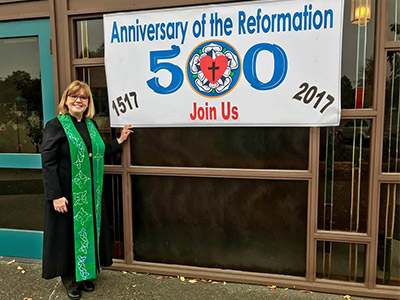When Cynthia Alloway ’13 began the Doctor of Ministry program at Pittsburgh Theological Seminary, she brought with her a rich education in in both science and theology—a B.S. from the University of Iowa, an M.S. from UC San Francisco, and an M.Div. from Princeton Seminary. “I wanted to combine my past science background with a doctorate in ministry,” Cynthia notes, “and, uniquely among Presbyterian schools, Pittsburgh Theological Seminary offered just what I was looking for—a D.Min. in Science and Theology. I was elated!”
When Cynthia graduated from the program in 2013, she was the first woman to receive the Seminary’s D.Min. in this focus area. Now in her sermons at Presbyterian Church of the Roses in Santa Rosa, Calif., she combines science and theology to address her congregation’s physical and spiritual health needs. “Research on the connection between spirituality and health shows the important impact that spiritual practices can have on physical and mental wellness,” Cynthia notes. “So for my Doctor of Ministry project I conducted a six-week study comparing three groups of people who prayed daily in three different ways. I measured each participant’s resilience status before and after the six-week period of time.”
Cynthia goes on to explain the results: “The people using the contemplative form of prayer showed significant improvement in resilience status as measured through a survey developed by healthcare professionals. The group that used a prayer-bead form of praying also showed enhanced resilience. The group of people who followed their normal routine of praying spontaneously showed static resilience status.” Cynthia’s findings motivated her to promote contemplative prayer more intentionally in her ministry as one of the ways of enhancing resilience for healthy living.
“I believe it is vital for all pastors to become knowledgeable and provide this information to their congregations in order to promote wholeness in body, mind, and spirit,” says Cynthia. And she should know something of the importance of holistic health. Prior to becoming an ordained minister, she worked as a counselor and volunteered as a parish nurse in churches to help them develop their faith-and-health ministries. Also, both before and after seminary she spent 32 years working as a psychiatric nurse therapist and a forensic nurse specializing in helping victims of trauma.
As a pastor, Cynthia now finds that the opportunity to concentrate her D.Min. studies in science and theology has greatly enhanced her ability to provide a more holistic ministry to her congregation and the surrounding community. “I am eternally grateful for this program,” she says.

